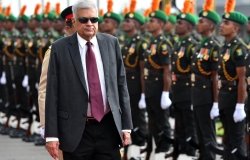The Changing Face of Canada-U.S. Relations
Professor Andrew Cohen of Carleton University talked about recent dynamics in the Canada-U.S relationship, providing a broad overview of the bilateral relationship in the context of successive governments in Ottawa.
Overview
The Canada Institute and Carleton University Alumni Association hosted Professor Andrew Cohen of Carleton University's School of Journalism and Communication, who talked about recent dynamics in the Canada-U.S relationship. Professor Cohen provided a broad overview of the bilateral relationship in the context of successive governments in Ottawa. With the recent return of the Conservatives to power, expectations of Canada's relations with the United States have shifted, focusing on whether the climate will improve.
Prime Minister Harper set out an explicit, five-point agenda, which he reiterated in the remarkably brief Speech to the Throne. The logic underpinning such a straightforward agenda reflects an acute political calculation on the part of Harper. Cohen explained that the election result suggested the Conservatives were "hired on probation"; hence Harper's focus on his five targeted proposals, which could yield concrete accomplishments, allowing him to eventually go the polls to seek a majority government. Neither Canada-U.S. relations nor foreign policy more generally are part of the prime minister's platform. Yet there are signs that Harper could adopt an "activist foreign policy." His first trip abroad—to visit Canadian troops in Afghanistan—was a political success, and did not go unnoticed in Washington. Cohen argued for "focused attention on Canada-U.S. relations." He noted approvingly that Harper said that "America is Canada's best friend" in the Speech to the Throne—A straightforward statement, but "one we haven't heard in a while." Cohen emphasized the importance of having a nimble diplomacy in Washington, a posting "too important to be left to the professionals." Indeed, "it's no longer enough to issue a diplomatic note when our feelings are hurt; we need to respond swiftly and in the public square." This requires a presence on Capitol Hill and an effective public diplomacy strategy. The Canadian embassy has strengthened both these crucial areas recently.
But ultimately, it is questionable whether such a change makes a tangible difference. There is a noticeable change of personal style between Martin and Harper to be sure, but whether a new leader can affect the substantive issues of the bilateral relationship is another matter. Cohen predicted little movement on the recurrent softwood lumber dispute and suggested that the arrival of a new government in Canada would not transform the dynamics on pressing security issues, including the looming passport requirement. Among other issues to watch closely under the new Harper government, Cohen suggested three in particular: (i) the efforts to rebuild Canada's military capacity; (ii) Arctic sovereignty; and (iii) management of Canada's water resources (i.e., how to address overtures by the United states to purchase bulk water from Canada, which is likely to become an issue, if not in the short term, then certainly in the medium term).
David N. Biette
Director, Canada Institute
(202) 691-4133
Drafted by Christophe Leroy
Hosted By

Canada Institute
The mission of the Wilson Center's Canada Institute is to raise the level of knowledge of Canada in the United States, particularly within the Washington, DC policy community. Research projects, initiatives, podcasts, and publications cover contemporary Canada, US-Canadian relations, North American political economy, and Canada's global role as it intersects with US national interests. Read more
Thank you for your interest in this event. Please send any feedback or questions to our Events staff.










